俄罗斯的崛起之路【英文】
- 格式:ppt
- 大小:1.12 MB
- 文档页数:14
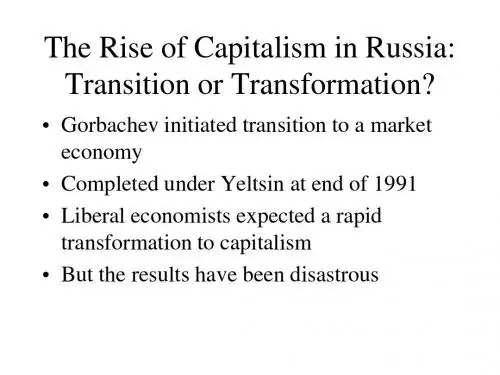
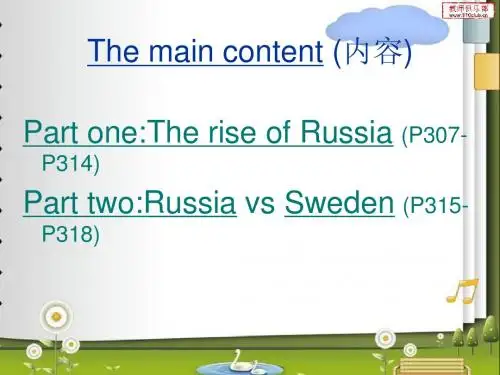
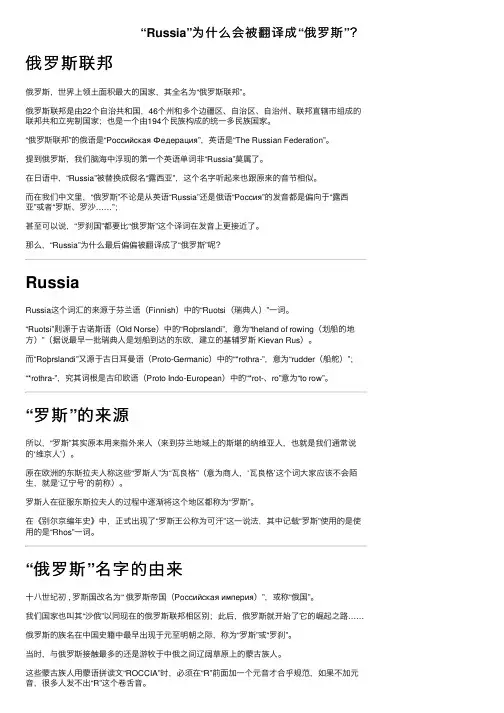
“Russia”为什么会被翻译成“俄罗斯”?俄罗斯联邦俄罗斯,世界上领⼟⾯积最⼤的国家,其全名为“俄罗斯联邦”。
俄罗斯联邦是由22个⾃治共和国,46个州和多个边疆区、⾃治区、⾃治州、联邦直辖市组成的联邦共和⽴宪制国家;也是⼀个由194个民族构成的统⼀多民族国家。
“俄罗斯联邦”的俄语是“Российская Федерация”,英语是“The Russian Federation”。
提到俄罗斯,我们脑海中浮现的第⼀个英语单词⾮“Russia”莫属了。
在⽇语中,“Russia”被替换成假名“露西亚”,这个名字听起来也跟原来的⾳节相似。
⽽在我们中⽂⾥,“俄罗斯”不论是从英语“Russia”还是俄语“Россия”的发⾳都是偏向于“露西亚”或者“罗斯、罗沙……”;甚⾄可以说,“罗刹国”都要⽐“俄罗斯”这个译词在发⾳上更接近了。
那么,“Russia”为什么最后偏偏被翻译成了“俄罗斯”呢?RussiaRussia这个词汇的来源于芬兰语(Finnish)中的“Ruotsi(瑞典⼈)”⼀词。
“Ruotsi”则源于古诺斯语(Old Norse)中的“Roþrslandi”,意为“theland of rowing(划船的地⽅)”(据说最早⼀批瑞典⼈是划船到达的东欧,建⽴的基辅罗斯 Kievan Rus)。
⽽“Roþrslandi”⼜源于古⽇⽿曼语(Proto-Germanic)中的“*rothra-”,意为“rudder(船舵)”;“*rothra-”,究其词根是古印欧语(Proto Indo-European)中的“*rot-、ro”意为“to row”。
“罗斯”的来源所以,“罗斯”其实原本⽤来指外来⼈(来到芬兰地域上的斯堪的纳维亚⼈,也就是我们通常说的‘维京⼈’)。
原在欧洲的东斯拉夫⼈称这些“罗斯⼈”为“⽡良格”(意为商⼈,‘⽡良格’这个词⼤家应该不会陌⽣,就是‘辽宁号’的前称)。
罗斯⼈在征服东斯拉夫⼈的过程中逐渐将这个地区都称为“罗斯”。
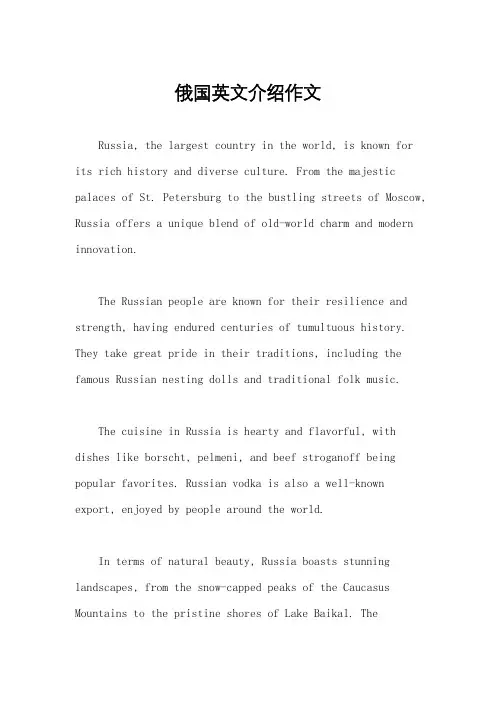
俄国英文介绍作文Russia, the largest country in the world, is known for its rich history and diverse culture. From the majestic palaces of St. Petersburg to the bustling streets of Moscow, Russia offers a unique blend of old-world charm and modern innovation.The Russian people are known for their resilience and strength, having endured centuries of tumultuous history. They take great pride in their traditions, including the famous Russian nesting dolls and traditional folk music.The cuisine in Russia is hearty and flavorful, with dishes like borscht, pelmeni, and beef stroganoff being popular favorites. Russian vodka is also a well-known export, enjoyed by people around the world.In terms of natural beauty, Russia boasts stunning landscapes, from the snow-capped peaks of the Caucasus Mountains to the pristine shores of Lake Baikal. Thecountry is also home to a diverse array of wildlife, including the iconic Siberian tiger and the elusive snow leopard.Russian literature and art have made a significant impact on the world, with authors like Leo Tolstoy and Fyodor Dostoevsky and artists like Wassily Kandinsky and Marc Chagall leaving a lasting legacy.Overall, Russia is a country of great contrasts, from its harsh winters to its warm and welcoming people. It is a place that captivates the imagination and leaves a lasting impression on all who visit.。
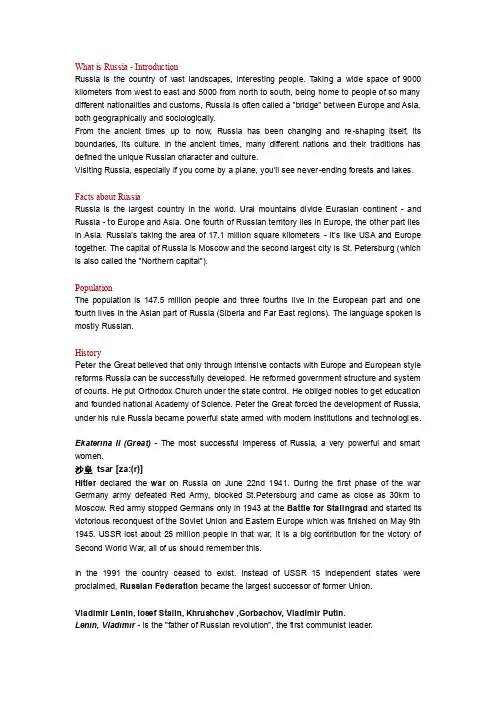
What is Russia - IntroductionRussia is the country of vast landscapes, interesting people. T aking a wide space of 9000 kilometers from west to east and 5000 from north to south, being home to people of so many different nationalities and customs, Russia is often called a "bridge" between Europe and Asia, both geographically and sociologically.From the ancient times up to now, Russia has been changing and re-shaping itself, its boundaries, its culture. In the ancient times, many different nations and their traditions has defined the unique Russian character and culture.Visiting Russia, especially if you come by a plane, you'll see never-ending forests and lakes.Facts about RussiaRussia is the largest country in the world. Ural mountains divide Eurasian continent - and Russia - to Europe and Asia. One fourth of Russian territory lies in Europe, the other part lies in Asia. Russia’s taking the area of 17.1 million square kilometers - it’s like USA and Europe together. The capital of Russia is Moscow and the second largest city is St. Petersburg (which is also called the "Northern capital").PopulationThe population is 147.5 million people and three fourths live in the European part and one fourth lives in the Asian part of Russia (Siberia and Far East regions). The language spoken is mostly Russian.HistoryPeter the Great believed that only through intensive contacts with Europe and European style reforms Russia can be successfully developed. He reformed government structure and system of courts. He put Orthodox Church under the state control. He obliged nobles to get education and founded national Academy of Science. Peter the Great forced the development of Russia, under his rule Russia became powerful state armed with modern institutions and technologi es.Ekaterina II (Great) - The most successful imperess of Russia, a very powerful and smart women.沙皇tsar [za:(r)]Hitler declared the war on Russia on June 22nd 1941. During the first phase of the war Germany army defeated Red Army, blocked St.Petersburg and came as close as 30km to Moscow. Red army stopped Germans only in 1943 at the Battle for Stalingrad and started its victorious reconquest of the Soviet Union and Eastern Europe which was finished on May 9th 1945. USSR lost about 25 million people in that war, it is a big contribution for the victory of Second World War, all of us should remember this.In the 1991 the country ceased to exist. Instead of USSR 15 independent states were proclaimed, Russian Federation became the largest successor of former Union.Vladimir Lenin, Iosef Stalin, Khrushchev ,Gorbachov, Vladimir Putin.Lenin, Vladimir - is the "father of Russian revolution", the first communist leader.Eltsin, Boris - the first President of the Russian Federation, who was died in April of this year. Putin, Vladimir - the second President of the Russian FederationWhy Vladimir use Lenin as his nickname?Putin—song? Smoking, drinking, family violence, three big social crisis.MoscowMoscow, capital and largest city of Russia, and the country’s leading political, cultura l, economic, and transportation center. Moscow lies on the Moscow River in the west central European part of Russia.Moscow has matured over a millennium into a richly layered, ever-expanding, and never-sleeping metropolis. Its sporadic growth has left it without a compact downtown, which means that great sights, hotels, and restaurants can be found in nearly any corner of the city. Its vast territory requires a good bit of walking and plenty of rides via metro (subway), taxi, or tour bus.Moscow has a continental climate, with long, cold winters and short, mild summers.。
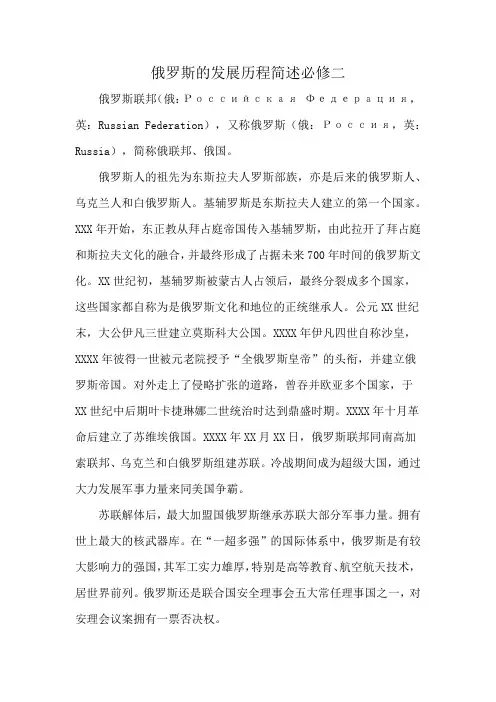
俄罗斯的发展历程简述必修二俄罗斯联邦(俄:РоссийскаяФедерация,英:Russian Federation),又称俄罗斯(俄:Россия,英:Russia),简称俄联邦、俄国。
俄罗斯人的祖先为东斯拉夫人罗斯部族,亦是后来的俄罗斯人、乌克兰人和白俄罗斯人。
基辅罗斯是东斯拉夫人建立的第一个国家。
XXX年开始,东正教从拜占庭帝国传入基辅罗斯,由此拉开了拜占庭和斯拉夫文化的融合,并最终形成了占据未来700年时间的俄罗斯文化。
XX世纪初,基辅罗斯被蒙古人占领后,最终分裂成多个国家,这些国家都自称为是俄罗斯文化和地位的正统继承人。
公元XX世纪末,大公伊凡三世建立莫斯科大公国。
XXXX年伊凡四世自称沙皇,XXXX年彼得一世被元老院授予“全俄罗斯皇帝”的头衔,并建立俄罗斯帝国。
对外走上了侵略扩张的道路,曾吞并欧亚多个国家,于XX世纪中后期叶卡捷琳娜二世统治时达到鼎盛时期。
XXXX年十月革命后建立了苏维埃俄国。
XXXX年XX月XX日,俄罗斯联邦同南高加索联邦、乌克兰和白俄罗斯组建苏联。
冷战期间成为超级大国,通过大力发展军事力量来同美国争霸。
苏联解体后,最大加盟国俄罗斯继承苏联大部分军事力量。
拥有世上最大的核武器库。
在“一超多强”的国际体系中,俄罗斯是有较大影响力的强国,其军工实力雄厚,特别是高等教育、航空航天技术,居世界前列。
俄罗斯还是联合国安全理事会五大常任理事国之一,对安理会议案拥有一票否决权。
1、早期历史俄罗斯历史起源于东欧草原上的东斯拉夫人,混血的罗斯人是俄罗斯人和白俄罗斯人、乌克兰人的共同祖先。
基辅罗斯是东斯拉夫人建立的第一个国家。
2、基辅罗斯时期早在公元1世纪,在中、东欧的第聂伯河、奥得河、维斯瓦河及布格河流域便住着了斯拉夫人。
至X世纪,斯拉夫人分为东斯拉夫人、西斯拉夫人和南斯拉夫人。
东斯拉夫人分布在第聂伯河中、上游,奥卡河、伏尔加河上游,西德维纳河一带,成为俄罗斯人、白俄罗斯人及乌克兰人的祖先。
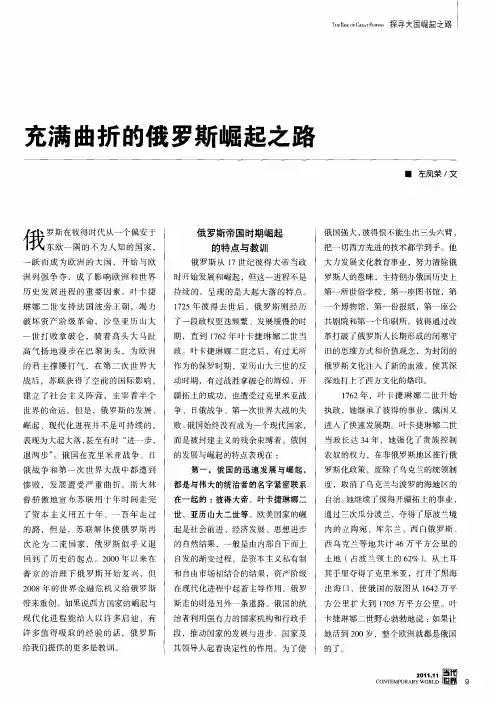
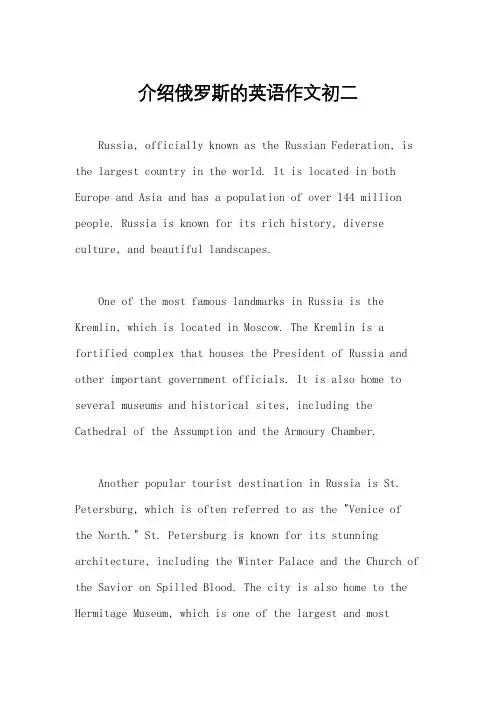
介绍俄罗斯的英语作文初二Russia, officially known as the Russian Federation, is the largest country in the world. It is located in both Europe and Asia and has a population of over 144 million people. Russia is known for its rich history, diverse culture, and beautiful landscapes.One of the most famous landmarks in Russia is the Kremlin, which is located in Moscow. The Kremlin is a fortified complex that houses the President of Russia and other important government officials. It is also home to several museums and historical sites, including the Cathedral of the Assumption and the Armoury Chamber.Another popular tourist destination in Russia is St. Petersburg, which is often referred to as the "Venice of the North." St. Petersburg is known for its stunning architecture, including the Winter Palace and the Church of the Savior on Spilled Blood. The city is also home to the Hermitage Museum, which is one of the largest and mostprestigious art museums in the world.Russia is also famous for its literature, music, and art. Some of the most well-known Russian writers include Leo Tolstoy, Fyodor Dostoevsky, and Anton Chekhov. Russian classical music is also highly regarded, with composers such as Tchaikovsky and Rachmaninoff being world-renowned. Russian art is also famous, with artists such as Kandinsky and Malevich being pioneers of abstract art.In terms of cuisine, Russia is known for its hearty and filling dishes. Some popular Russian dishes include borscht (a soup made with beets and vegetables), pelmeni (dumplings filled with meat), and blini (thin pancakes served with various toppings).Overall, Russia is a fascinating country with a rich history and culture. Whether you are interested in exploring its historical landmarks, admiring its art and literature, or trying its delicious cuisine, there is something for everyone in Russia.。
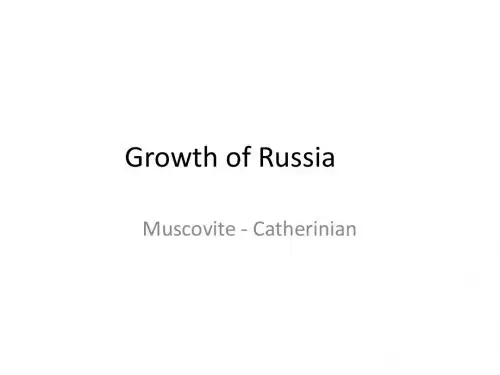
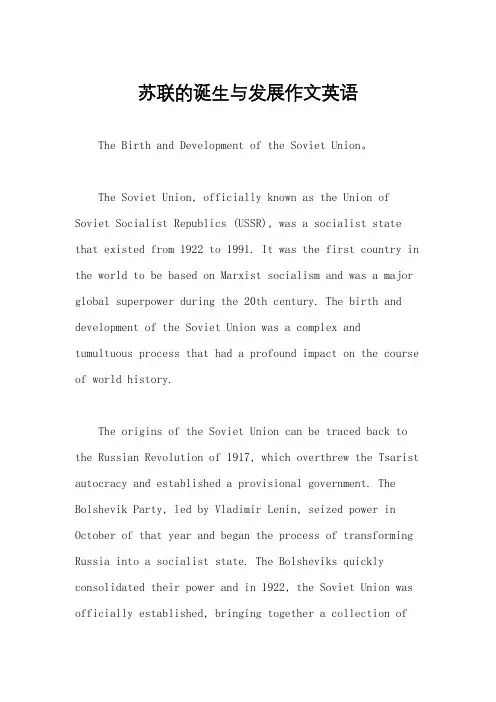
苏联的诞生与发展作文英语The Birth and Development of the Soviet Union。
The Soviet Union, officially known as the Union of Soviet Socialist Republics (USSR), was a socialist state that existed from 1922 to 1991. It was the first country in the world to be based on Marxist socialism and was a major global superpower during the 20th century. The birth and development of the Soviet Union was a complex and tumultuous process that had a profound impact on the course of world history.The origins of the Soviet Union can be traced back to the Russian Revolution of 1917, which overthrew the Tsarist autocracy and established a provisional government. The Bolshevik Party, led by Vladimir Lenin, seized power in October of that year and began the process of transforming Russia into a socialist state. The Bolsheviks quickly consolidated their power and in 1922, the Soviet Union was officially established, bringing together a collection ofSoviet republics under a centralized government.The early years of the Soviet Union were marked by a series of internal struggles and external challenges. The country was devastated by the Russian Civil War, which pitted the Bolsheviks against a variety of anti-communist forces. The Bolsheviks emerged victorious, but at a great cost in terms of human life and economic destruction. The Soviet Union also faced hostility from Western powers, who sought to contain the spread of communism and undermine the new socialist state.Despite these challenges, the Soviet Union embarked on a program of rapid industrialization and collectivization in the 1930s under the leadership of Joseph Stalin. This period, known as the Great Purge, was marked by widespread repression, political purges, and forced labor camps. Millions of people were killed or imprisoned during this time, and the Soviet Union became a totalitarian state characterized by a cult of personality around Stalin.The Soviet Union played a major role in World War II,fighting against Nazi Germany on the Eastern Front. The Soviet Union suffered heavy casualties, but ultimately emerged victorious and played a key role in the defeat of the Axis powers. The war solidified the Soviet Union'sstatus as a global superpower and led to the expansion ofits influence in Eastern Europe and Asia.The post-war period saw the Soviet Union engaged in a tense and protracted Cold War with the United States andits allies. The two superpowers competed for influence around the world, leading to a series of proxy wars andarms races. The Soviet Union also faced internal challenges, including economic stagnation, political unrest, and nationalist movements in its satellite states.By the late 1980s, the Soviet Union was facing mounting internal and external pressures. The policies of Mikhail Gorbachev, including glasnost (openness) and perestroika (restructuring), aimed to reform the Soviet system and address its many problems. However, these reformsultimately led to the unraveling of the Soviet Union, as nationalist movements in its republics sought independenceand the central government lost control.In December 1991, the Soviet Union officially dissolved, marking the end of one of the most powerful and influential states in modern history. The legacy of the Soviet Union continues to shape the world today, with its impact stillfelt in the politics, economics, and culture of many countries around the world.In conclusion, the birth and development of the Soviet Union was a complex and tumultuous process that had a profound impact on the course of world history. From its origins in the Russian Revolution to its eventualdissolution in 1991, the Soviet Union was a major global superpower that shaped the 20th century in profound ways.Its legacy continues to be felt today, as the worldgrapples with the consequences of its rise and fall.。
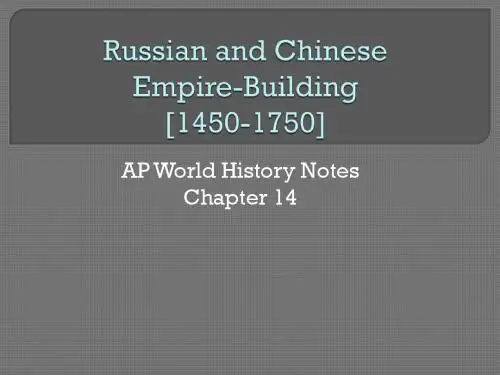
苏联历史英语作文The Soviet Union, officially known as the Union of Soviet Socialist Republics (USSR), was a socialist state that existed from 1922 to 1991. It was a unique experiment in statecraft, encompassing a vast territory that spanned across Eastern Europe, Northern Asia, and parts of Central Asia.The Birth of the Soviet UnionThe Soviet Union was born out of the Russian Revolution of 1917, which was a pivotal moment in world history. The October Revolution, led by the Bolshevik Party under the leadership of Vladimir Lenin, overthrew the Provisional Government and established a socialist government. The new government faced immediate challenges, including a civil war and foreign intervention, which they managed to overcome.The Rise of StalinAfter Lenin's death in 1924, Joseph Stalin rose to power. His rule was characterized by rapid industrialization and collectivization of agriculture, which transformed the Soviet Union into a major industrial power. However, these policies also led to widespread famine and the Great Purge, a campaign of political repression that resulted in the deaths of many perceived enemies of the state.World War II and the Soviet VictoryThe Soviet Union played a crucial role in World War II, suffering immense losses but ultimately emerging victorious against Nazi Germany. The Red Army's advance into Berlin in 1945 marked the end of the war in Europe. The Soviet Union's sacrifices during the war were immense, with millions ofSoviet citizens losing their lives.The Cold War EraThe post-war period saw the beginning of the Cold War, aperiod of geopolitical tension between the Soviet Union andthe United States. The USSR became a superpower, leading the Eastern Bloc in a bipolar world. The Soviet Union was a key player in the Space Race, launching the first artificial satellite, Sputnik, and sending the first human, Yuri Gagarin, into space.Economic Struggles and GlasnostBy the 1980s, the Soviet economy was struggling under the weight of its military expenditures and inefficiencies.Mikhail Gorbachev came to power in 1985 and introducedpolicies of glasnost (openness) and perestroika (restructuring) in an attempt to reform the system. These policies led to greater freedom of speech and political openness, but also sowed the seeds of the Soviet Union's eventual dissolution.The Collapse of the Soviet UnionThe late 1980s and early 1990s saw a wave of independence movements in the Soviet republics. The Baltic states, followed by other republics, declared independence. The Soviet Union officially dissolved on December 26, 1991, marking the end of the Cold War and the beginning of a new era for the former Soviet states.Legacy and ImpactThe Soviet Union's legacy is complex and multifaceted. It was a time of great scientific and cultural achievements, but also of political repression and economic hardship. The USSR's collapse left a lasting impact on the world, with its former republics navigating their own paths in the post-Soviet landscape.In conclusion, the Soviet Union was a significant chapter in world history, marked by both triumphs and tragedies. Its story is one of ambition, resilience, and ultimately, transformation. Understanding the Soviet Union's history is crucial for grasping the complexities of modern geopolitics and the ongoing legacies of this once-mighty state.。
介绍俄罗斯的英语作文Russia, officially known as the Russian Federation, is the largest country in the world by land area. It spans across Eastern Europe and Northern Asia, covering more than one-eighth of the Earth's inhabited land area. With a population of over 144 million people, it is the ninth most populous country in the world. Russia is a country rich in history, culture, and natural resources, making it a fascinating and diverse place to explore.One of the most iconic landmarks in Russia is the Kremlin, a fortified complex in the heart of Moscow that serves as the official residence of the President of the Russian Federation. The Kremlin is home to several palaces, cathedrals, and museums, including the famous Armoury Chamber, which houses a vast collection of royal treasures, including Fabergé eggs, imperial carriages, and ceremonial weapons. The Kremlin is also home to the stunning Cathedral of the Annunciation and the Cathedral of the Archangel, both of which are renowned for their beautiful frescoes andicons.Another must-see destination in Russia is the Hermitage Museum in St. Petersburg. This world-renowned museum is one of the largest and oldest in the world, boasting a collection of over three million items, including works of art by Leonardo da Vinci, Rembrandt, and Michelangelo. The museum is housed in the Winter Palace, a magnificent Baroque-style building that was once the official residence of the Russian monarchs.In addition to its rich cultural heritage, Russia is also home to some of the most breathtaking natural landscapes in the world. The country is home to the Ural Mountains, which separate Europe from Asia, as well as the vast Siberian plains, which are home to some of the last remaining wilderness areas on the planet. Lake Baikal, located in Siberia, is the deepest and oldest freshwater lake in the world, and is home to a unique and diverse ecosystem. The Kamchatka Peninsula, located in the Russian Far East, is home to over 300 volcanoes, making it one of the most geologically active regions in the world.Russian cuisine is another aspect of the country that is not to be missed. Traditional Russian dishes include borscht, a hearty beet soup, pelmeni, a type of dumpling, and blini, thin pancakes served with a variety of sweet or savory fillings. Russian cuisine is known for its use of fresh and locally-sourced ingredients, and is a reflection of the country's diverse and rich culinary traditions.In conclusion, Russia is a country that offers a wealth of experiences for travelers. From its rich history and culture to its stunning natural landscapes and delicious cuisine, there is something for everyone to enjoy in this vast and diverse country. Whether you are exploring the historic streets of Moscow, admiring the art at the Hermitage Museum, or trekking through the wilds of Siberia, Russia is a destination that is sure to leave a lasting impression.。
崛起之路的英语Rise of the RoadRise of the Road is a game in which you must build your own civilization and rise to the top of the ranks. You will face many challenges, like finding resources, building your base, and facing off against other civilizations. You will have to choose wisely between military power and diplomacy in order to become the ultimate ruler.The game starts with you being the leader of a tribe. You must build up your resources, build structures, and find a way to defend yourself. As your civilization grows, you will face off against other civilizations. You will have to choose between war, economic and cultural strategies in order to overcome your opponents.You will be able to trade resources with other civilizations, use diplomacy to create alliances, and utilize technological advances in order to become the strongest civilization. You will also have to keep your citizens happy by constructing public buildings and providing them with food, entertainment, and education.Rise of the Road is an exciting and challenging game. Itrequires a lot of strategy and a firm grasp on the different aspects of game play. It is also a great way to learn about different civilizations and cultures, while having a great time. Play Rise of the Road and become the ruler of the world!。
沙俄历史介绍英文作文下载温馨提示:该文档是我店铺精心编制而成,希望大家下载以后,能够帮助大家解决实际的问题。
文档下载后可定制随意修改,请根据实际需要进行相应的调整和使用,谢谢!并且,本店铺为大家提供各种各样类型的实用资料,如教育随笔、日记赏析、句子摘抄、古诗大全、经典美文、话题作文、工作总结、词语解析、文案摘录、其他资料等等,如想了解不同资料格式和写法,敬请关注!Download tips: This document is carefully compiled by theeditor. I hope that after you download them,they can help yousolve practical problems. The document can be customized andmodified after downloading,please adjust and use it according toactual needs, thank you!In addition, our shop provides you with various types ofpractical materials,such as educational essays, diaryappreciation,sentence excerpts,ancient poems,classic articles,topic composition,work summary,word parsing,copyexcerpts,other materials and so on,want to know different data formats andwriting methods,please pay attention!Russia used to be a great empire. It had a vast territory and a rich history.The Tsars ruled Russia for a long time. They had a lot of power and made many important decisions.There were also many wars and conflicts in Russian history. The people faced many challenges.Russian culture is very unique. It includes beautiful art, music, and literature.The Soviet Union was an important period in Russian history. It had a big impact on the world.。
俄罗斯作文中英文Here is an essay on the topic of "Russia" with a word count exceeding 1,000 words, written entirely in English without any extra punctuation or unrelated content:Russia is a vast and diverse country that has captivated the world's attention for centuries. As the largest country in the world, Russia spans across 11 time zones and encompasses a wide range of landscapes, from snow-capped mountains and vast tundras to lush forests and bustling cities. Its rich history, unique culture, and complex geopolitical role have made it a subject of fascination and intrigue for people worldwide.Russia's history is marked by both periods of greatness and turmoil. From the powerful Kievan Rus' to the mighty Russian Empire, the country has seen the rise and fall of various dynasties and political systems. The Romanov dynasty, which ruled Russia for more than 300 years, was known for its opulence, cultural patronage, and expansionist policies. The emergence of the Soviet Union in the aftermath of the Russian Revolution brought about a radical transformation, as the country embraced Communist ideology and became a global superpower.Throughout its history, Russia has been a melting pot of diverse cultures and ethnicities. The country is home to more than 190 different ethnic groups, each with its own unique customs, traditions, and languages. This diversity is reflected in the country's art, music, and architecture, which blend influences from across Eurasia. From the ornate onion-domed churches of Moscow to the vibrant folk art of Siberia, Russia's cultural heritage is both vast and captivating.One of the most striking aspects of Russian culture is its literature. Russia has produced some of the world's greatest authors, from the poetic masterpieces of Alexander Pushkin to the psychological depth of Fyodor Dostoevsky. These writers have not only captured the essence of the Russian soul but have also explored universal themes of love, suffering, and the human condition. The rich literary tradition of Russia has had a profound impact on world literature and continues to inspire readers and writers around the globe.In addition to its cultural achievements, Russia has also played a significant role in shaping the global political landscape. As a key player in the Cold War, Russia (then the Soviet Union) was engaged in a fierce ideological and geopolitical battle with the United States and its allies. The space race, the Cuban Missile Crisis, and the arms race were just a few of the high-stakes conflicts that defined this era of global tension.Today, Russia continues to be a major player on the world stage, wielding significant economic and military power. The country's vast natural resources, particularly its oil and gas reserves, have made it a vital player in global energy markets. Russia's strong military, including its nuclear arsenal, has also made it a force to be reckoned with in international affairs.However, Russia's modern history has not been without its challenges. The collapse of the Soviet Union in 1991 led to a period of economic and political upheaval, as the country struggled to transition from a centralized, communist system to a market-based economy and democratic political structure. The rise of Vladimir Putin and the consolidation of power under his leadership have also raised concerns about the state of democracy and human rights in Russia.Despite these challenges, Russia remains a fascinating and complex country. Its rich cultural heritage, its towering historical figures, and its influential role in global affairs continue to captivate the world's attention. As the country navigates the challenges of the 21st century, it will be interesting to see how it evolves and how its unique identity and influence will continue to shape the course of world events.。